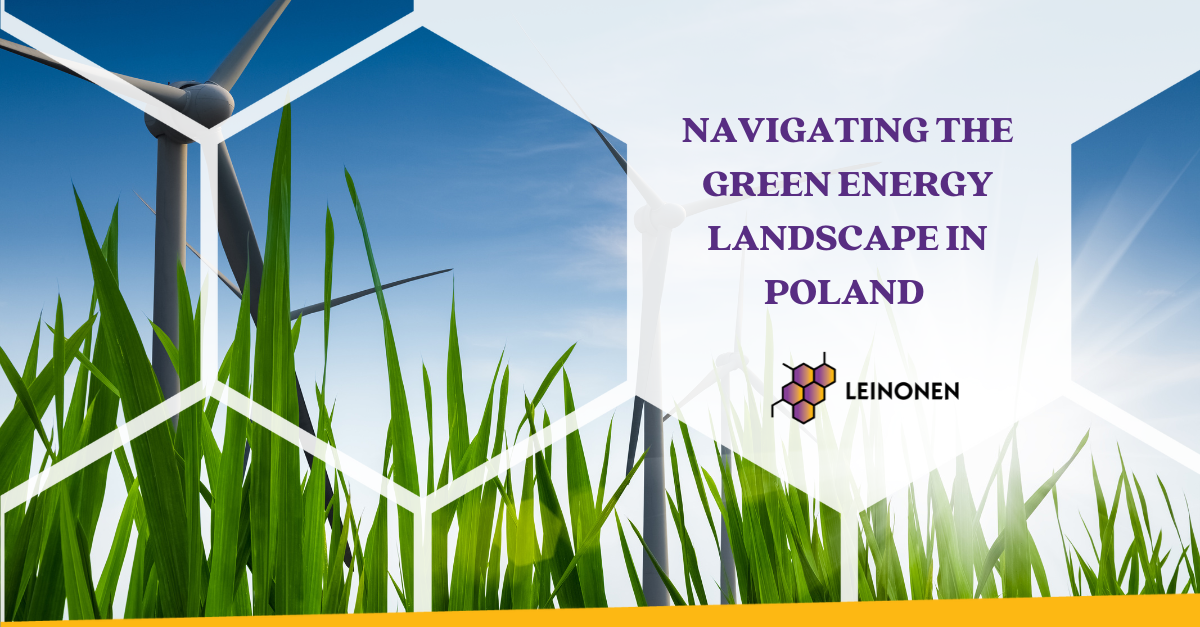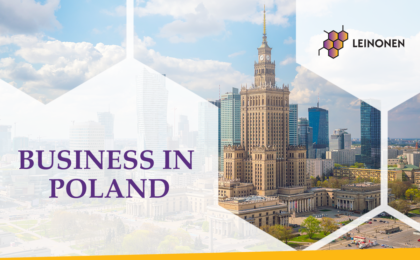In the pursuit of climate neutrality by 2050, the European Union has set ambitious goals for member states. Among these targets, Poland aims to increase its share of renewable energy sources to 21-23% of final gross energy consumption by 2030. Solar energy in particular has emerged as a dynamic force in this transition.
Leinonen Poland is actively involved in assisting companies in the green energy sector, with projects ranging from 53 MW to 202 MW.
Accounting Challenges in Green Energy
The unique nature of renewable energy projects presents specific accounting challenges. Leinonen Poland grapples with questions such as obtaining external financing, tax-efficient project implementation, and the intricacies of settlement structures.
Accounting rules in the green energy industry have their own specific aspects due to the nature of the business in the field of renewable energy sources (RES). This poses many questions and challenges for accountants:
- What is the process of obtaining external financing?
- How to implement RES projects in an effective and tax-friendly way?
- What to look for when determining the settlement structure of RES projects?
- How to properly include accounting transactions related to certificates of origin for electricity and CO2 emission rights?
- How to correctly settle property tax?
Laws and Regulations Governing Green Energy
Energy companies, classified as “strategic” due to their pivotal role in the supply chain, are subject to rigorous legal and regulatory frameworks. Key legislations include the Energy Law of April 10, 1997, and the Accounting Standards Committee’s positions on greenhouse gas emission allowances.
Companies in the initial stages of green energy investments in Poland are actively engaged in negotiations with operators for grid connections. These negotiations are essential in setting the terms for project commencement, reflecting the importance of proper accounting in project planning and execution.
Essential Certificates and Documentation
An important document is the Application for defining the conditions for connecting a photovoltaic power plant to the power grid. It must be prepared and submitted to the electricity grid operator in your region. The following documentation must be attached to the application:
- Technical data of the photovoltaic power plant, such as installed capacity, type of solar panels, inverters, location, etc.
- Geospatial data on the location of the power plant, including geographical coordinates.
- Power plant plan and electrical diagrams.
- Technical documentation and certificates for solar panels and inverters.
- Information on the type of connection and power installation that must be adapted or built to connect the power plant to the grid.
The procedure for determining the connection conditions is regulated in the Energy Law, the System Regulation, as well as in the relevant Instructions for the Operation and Operation of the Transmission Network.
The condition for the application to be considered is to make an advance payment in the appropriate amount. The waiting time for consideration of the submitted application depends on qualifying it to the appropriate connection group. For applications from group II (high voltage) it is up to 150 days.
After receiving the connection conditions, the applicant has two years to negotiate the conditions and sign the connection agreement. The network connection agreement signed by both parties is the basis for commencing design, construction and assembly works related to the implementation of the investment.
Accountant’s Perspective
Activities related to energy production are closely related to the impact on the natural environment, hence numerous regulations introduced around the world at the levels of international and national organizations to limit this impact. The Polish legislator, following the EU legislator, introduced regulations aimed at promoting energy produced from renewable sources and for undertaking energy efficiency projects.
To guarantee the economic profitability of producing energy from renewable sources and implementing energy efficiency projects, it was necessary to introduce a system of financial incentives. The characteristics of the green energy industry have forced the creation of specific legal regulations, as well as instruments regulating their activities in terms of environmental impact. These instruments: energy certificates of origin and CO2 emission allowances became traded on the commodity exchange. The extremely complex mechanism of operation of these instruments poses huge challenges to accounting in terms of recognizing, disbursing, and carrying out valuation of these components in the financial statements.
Due to the growing importance of RES, tax regulations and legal regulations are constantly modified to consider the specificity of this industry. Enterprises must stay up to date with regulations and adjust their accounting to new requirements.
The green energy industry is dynamic and subject to rapid changes, especially in the context of the development of new technologies and changing regulations. Therefore, enterprises in this industry must be flexible and adapt their accounting to changing conditions. Using the services of experienced accountants and tax advisors can be a key to maintaining proper accounting in the green energy industry.
Salary Insights
With an expected fivefold increase in employment in the renewable energy sector by 2050, various roles are in high demand. Electrical installers can earn over PLN 8,000, customer advisors over PLN 4,000, and renewable energy traders can see earnings around PLN 20,000 per month. (According to data on the website https://zielonagospodarka.pl /)
Renewable energy investments in Poland
The unstable gas market, limited energy supply combined with rising prices make energy security a priority. As a result, governments plan to accelerate and increase investments in renewable energy sources.
After the outbreak of the war in Ukraine, there were huge and rapid changes in the global energy market, which resulted in a retreat from Russian fuels, primarily natural gas and oil.
The energy crisis caused by the war in Ukraine forces everyone to look for new sources of energy. The current global economic situation, inflationary pressure and emerging signs of recession may facilitate increased spending on infrastructure projects. And this should create more opportunities for the renewable energy industry by increasing the demand for green energy.
In 2023, Poland advanced once again in the EY RECAI (Renewable Energy Country Attractiveness Index) ranking of the attractiveness of countries for those who invest in renewable energy sources: by one place to 17th position. At the same time, it has become the tenth (last year it was 15) the most attractive country in the world in the PPA ranking of contracts for long-term purchase/sale of energy from RES. This year’s ranking also evaluates the impact of the US Inflation Reduction Act on investments in renewable energy sources around the world.
As part of the RECAI ranking, countries are also assessed from the point of view of the attractiveness of the PPA (Power Purchase Agreement) market, i.e. contracts for the long-term purchase/sale of renewable electricity. From the perspective of the energy consumer, the main goal of the PPA is, on the one hand, to guarantee a fixed price and, on the other hand, to reduce emission rates. From the perspective of an energy producer, PPAs allow for a stable source of revenue in the long term.
This is the greatest advancement for Poland, which has become one of the leaders of the PPA market in Europe. It was overtaken by countries such as Spain, Germany, and Great Britain, which started their PPA path much earlier.
Many companies, including international ones, conduct significant production, trade and service activities in Poland. Considering the high average emission intensity of electricity generation in our country, enterprises are motivated to conclude PPAs for renewable energy sources.
At the end of 2022, the Polish government introduced a cap on energy producers, including on renewable energy prices, to protect consumers against excessive increases in energy prices, which led to high uncertainty regarding PPAs and many contract negotiation processes were suspended, delayed, or postponed.
However, the growing interest in PPA contracts, also in the context of the decline in prices in PPA contracts compared to last year and the prospects of abolishing these limits, should contribute to a further increase in concluded transactions. At the same time, the changes introduced in Rule 10H should stimulate an increase in the number of wind projects in the medium term, taking into account the necessary period of preparation and obtaining permits for this type of assets.
EY has been assessing the investment attractiveness of countries in terms of investments in renewable energy sources since 2003. The RECAI index covers the 40 largest markets in the world. Based on the RECAI database, EY is also publishing a second ranking from the end of 2021 – the attractiveness of the market for long-term contracts for the purchase and sale of renewable electricity under PPA contracts. In 2022, the so-called “normalized” RECAI index, which takes into account the GDP of individual countries.
In conclusion, Poland’s progress in the EY RECAI ranking and its standing as a leader in the Power Purchase Agreement market demonstrate its growing attractiveness for renewable energy investments. While challenges like the energy price cap and evolving legal frameworks persist, the green energy industry in Poland continues to thrive, presenting significant opportunities for both investors and professionals in the sector. When it comes to accounting and taxes connected with green energy, feel free to ask any further questions from Leinonen Poland (https://leinonen.eu/pol/).





